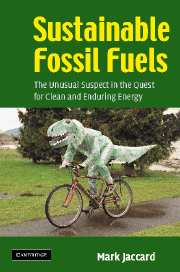Book contents
- Frontmatter
- Contents
- List of figures
- List of tables
- Preface
- Acknowledgments
- 1 What is energy sustainability?
- 2 Is our current energy path sustainable?
- 3 The prospects for clean secondary energy
- 4 The usual suspects: efficiency, nuclear and renewables
- 5 The unusual suspect: how long can fossil fuels last – and does it matter?
- 6 Can we use fossil fuels cleanly – and what might it cost?
- 7 Sustainable energy choices: comparing the options
- 8 Sustainable energy policy: how do we get there?
- 9 Broadening the definition: is sustainable energy sustainable?
- Bibliography
- Appendix ‒ synopsis and chapter reading guide
- Index
7 - Sustainable energy choices: comparing the options
Published online by Cambridge University Press: 06 July 2010
- Frontmatter
- Contents
- List of figures
- List of tables
- Preface
- Acknowledgments
- 1 What is energy sustainability?
- 2 Is our current energy path sustainable?
- 3 The prospects for clean secondary energy
- 4 The usual suspects: efficiency, nuclear and renewables
- 5 The unusual suspect: how long can fossil fuels last – and does it matter?
- 6 Can we use fossil fuels cleanly – and what might it cost?
- 7 Sustainable energy choices: comparing the options
- 8 Sustainable energy policy: how do we get there?
- 9 Broadening the definition: is sustainable energy sustainable?
- Bibliography
- Appendix ‒ synopsis and chapter reading guide
- Index
Summary
Over the next century and beyond humans will try to meet the growing demand for energy services resulting from population growth and the hoped-for improvement in the living standards of the planet's poorest people, whose needs seem so great today and whose children and grandchildren represent a growing percentage of humanity. We have four major options for addressing these growing service demands, each of which has its attractions. Energy efficiency reduces the need for primary energy while simultaneously addressing environmental objectives and is consistent with an ethical distaste for resource waste. Nuclear power emits no air pollutants or greenhouse gases and reflects the human passion for increasing technological sophistication. Renewables involve interception and use of the ubiquitous and continuous flow of energy in nature around us. Fossil fuels are not renewable, but the resource can endure for centuries and is a high quality form of energy that can be converted at modest cost and low environmental impact into electricity and hydrogen – the cleanest forms of secondary energy.
What should humanity do? What will humanity do? Should we pursue all four options equally? Should we focus just on one? Is there an optimal combination? How would we make this decision? To what extent is our decision constrained by inertial forces of technology and society?
In this chapter I address these questions. I start by developing criteria to reflect the major objectives and constraints that would influence our choice of primary energy options.
- Type
- Chapter
- Information
- Sustainable Fossil FuelsThe Unusual Suspect in the Quest for Clean and Enduring Energy, pp. 208 - 258Publisher: Cambridge University PressPrint publication year: 2006



